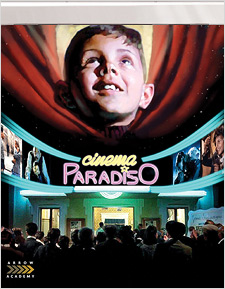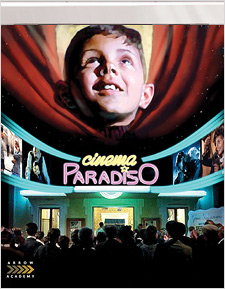Cinema Paradiso: Special Edition (Blu-ray Review)

Director
Giuseppe TornatoreRelease Date(s)
1988/2002 (March 21, 2017)Studio(s)
Les Films Ariane/Miramax Films (Arrow Films/Arrow Academy)- Film/Program Grade: See Below
- Video Grade: A
- Audio Grade: A
- Extras Grade: B
- Overall Grade: A-
Review
[Editor’s Note: The film portion of this review is by Matt Rowe, while the disc portion is by Bill Hunt.]
Love is defined by its naturally inherent capacity to possess. Once it has claimed its host, it secures that place by anchors. It can direct lives and actions, create new paths or, if not dealt with, can become a scourge. And that’s the premise of Cinema Paradiso. Directed by Guiseppe Tornatore, the film explores the multi-facets of love and examines romance and loss, friendship and fatherhood, and the all too frightening reality of irreversible change. And it does all of these things while also projecting a genuine appreciation for the medium of film.
Told in flashback, the story involves the growth of Salvatore (Salvatore Casio), also known as Toto, through three periods of his life. As a youngster in the village of Giancaldo, Toto develops an intense love for the movies. He finds every way to he can occupy a seat in the local movie theatre – a church that pulls double duty and thus serves the spiritual and emotional needs of the villagers. But Toto’s real desire is to gain access to the projection room. In his first visit, he manages to irritate the projectionist, Alfredo (Phillipe Noiret). But he also secures a promise concerning the excised romantic portions of film, which are considered pornographic by the town’s priest and are thus censored.
Through persistence and charm, Toto gains a surrogate father in the projectionist and the two become inseparable. Eventually, Toto grows into a young man (played by Marco Leonardi) and falls in love with a local girl. She’s filmed from afar by Toto as he becomes a budding filmmaker. A series of events transpire to alter these relationships – change which also can be seen in the village as a whole. Toto is bothered by this, so Alfredo encourages him to leave and move on to greater things. But when he returns to Giancaldo much later in life, Toto (now going by the name Salvatore, as played by Jacques Perrin) discovers that even greater change has occurred, and that no amount of time or distance can prevent this.
Cinema Paradiso is all about change. It examines the sad truth that we can never go back to what we once knew. But there’s magic here as well. Magic in the celebration of film is the vehicle that drives this story, the original version of which won an Oscar in 1989 for Best Foreign Film. It’s included on this disc as the 124-minute Cannes Festival Theatrical Version.
The Director’s Cut (sometimes called The New Version), was released in theatres for a limited run in 2002 and is expanded by some 50 minutes. It addresses a number of issues that were unresolved in the Theatrical Version, specifically dealing with the mystery of Elena. While some of the new footage is interspersed throughout the film, most of it comes at the end, effectively adding another element to the overall story. But while the new material does elevate the story to a higher level, not every scene is a necessary one. There are moments where the added footage is disrupting (particularly those dealing with useless sexual encounters), and serves only to steal from the poetic elegance of the original version. This is a case where less is actually more in many ways. I definitely prefer the original cut.
Arrow Academy’s 2-disc Blu-ray Special Edition was originally released in the U.K. in 2013, but it’s finally become available here in the States. If you haven’t already imported the Region B disc, it was well worth the wait. The original 35mm camera negative was scanned in 2K, then carefully graded and restored for this release. Both the Theatrical Version and The Director’s Cut are included in 1080p HD on separate discs, and are presented in their original 1.67:1 aspect ratio (which means you have very slight black bars on the sides of the 1.78:1 frame. Technically, the resulting image is a marvel. There’s extraordinary depth visible. Contrast is superb, with deep blacks, and outstanding detail retention. Texturing is refined and satisfying. Serious effort was made to preserve the film’s grain structure, which is apparent as an ever-present wash of light to moderate grain. Colors are warm, but accurate, and feature nice saturation. The print has been digitally cleaned of scratches and dust, yet not a trace of edge enhancement or unwanted filtering can be found. Really, it’s very hard to image either version of this film looking better than they do in this set.
The audio for both versions is provided in the original uncompressed Italian LPCM 2.0 Stereo, as well as Italian 5.1 DTS-HD Master Audio mixes, with optional English subtitles. The 2.0 tracks faithfully capture the original theatrical experience and offer good clarity and fidelity, but the sound field truly opens up and comes alive in the 5.1 mixes. For one thing, the sound has a much fuller quality in the 5.1, obvious in everything from music to dialogue to effects, rendering a much more natural listening experience. Clarity remains excellent, with no audible defects. Whichever version the film you watch, the 5.1 DTS-HD is definitely the preferred audio option.
In terms of bonus features, Disc One of Arrow’s set includes the Theatrical Version, along with an interesting audio commentary track with director Guiseppe Tornatore and the Italian cinema expert and critic Millicent Marcus. They were recorded separately; Marcus essentially “hosts” the track and does the bulk of the talking, while Tornatore joins her via occasional English audio excerpts. The disc also adds the following video-based features in a combination of SD and HD:
- A Dream of Sicily (54:45 – a 2000 documentary on the film produced by the Italian company Fandango and directed by Marc Evans)
- A Bear and a Mouse in Paradise (27:26)
- The Kissing Sequence (7:01)
- 25th Anniversary Trailer (1:04)
Disc Two includes The Director’s Cut, along the following in SD:
- Director’s Cut Trailer (1:24)
There’s also a very nice booklet in the package containing liner notes, production photos, and additional details about this release, and you get reversible cover artwork as well. For true cinephiles, all of these materials are well worth your time.
In terms of features that could be considered “missing” from this edition, the original Lionsgate/Miramax Blu-ray included a poor quality SD version of the original U.S. theatrical trailer. There was also a Limited Edition DVD box set from Miramax in 2006 that included a pair of additional featurettes (Exploring a Timeless Classic and Little Italy Love Story: Cinema Paradiso Style) as well as the Cucina Paradiso Food Network tribute, a CD soundtrack, and other swag items. Honestly, other than the CD (which you can purchase separately) you won’t miss any of it. So unless you really must keep everything, you can safely let your previous copies go.
Cinema Paradiso represents a high mark in film for me personally. It’s long been included among my top ten favorites, and I’m delighted to be able to revisit it in such quality. Arrow Academy’s new U.S. Blu-ray is easily the definitive release of this film on disc, as it’s packed with quality and value. Whichever version you prefer, Cinema Paradiso is filled with beautiful imagery and possesses a rare psychological and philosophical depth. It’s a cinematic delight that every serious fan of the medium of film should experience. Very highly recommended.
Film Rating (Theatrical Version/Director’s Cut): A+/A-
- Matthew A. Rowe

